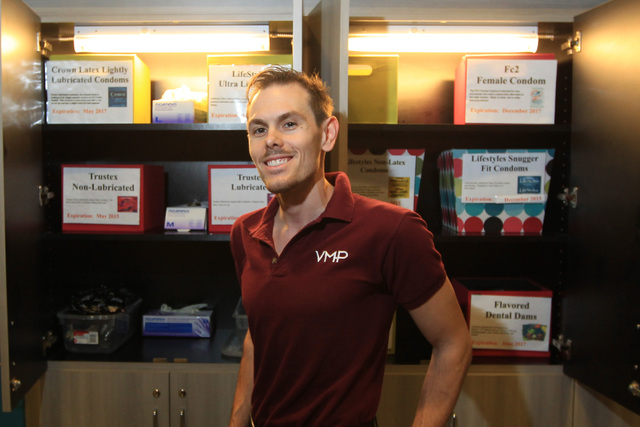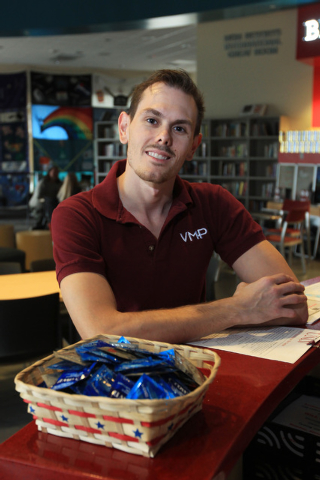Local honored for his work in HIV community outreach
Robert Peraza remembers tagging along with his friend as he navigated the new world of being diagnosed as HIV positive.
Watching his friend digest all the information, travel to all the appointments and wrap his head around new medications seemed daunting for him.
“Being on the outside will never measure up to what it’s like to actually go through it,” Peraza says.
That experience about seven years ago shed a light on what Peraza believed the community needed. So he started to volunteer at the Gay and Lesbian Community Center of Southern Nevada, popularly known as The Center.
Peraza works there now. He’s the outreach coordinator for the Vegas Mpowerment Project, which provides resources for gay, bisexual and transgender men ages 18 to 35.
From meet-ups and support groups to community outreach, Peraza works to help people learn about safer sex and identity issues.
Because of his advocacy as a coordinator, which includes HIV prevention, he was recently honored by Poz magazine, a publication dedicated to people affected by HIV/AIDS.
Editor-in-Chief Oriol Gutierrez says Poz was founded in 1994 to address issues within the LGBT community, particularly HIV. For the past five years, the magazine has identified a list of 100 up-and-comers working in the field.
“They were our unsung heroes,” Gutierrez says.
Each year, the list has a different focus, from community advocates to people living with the disease.
Peraza’s supervisor, Joshua Montgomery, was recognized by the magazine last year.
“I think that’s a great accomplishment for The Center to get highlighted like that two years in a row,” he says.
This year’s theme is advocates younger than 30.
“We wanted to make sure there was diversity in who was recognized,” Gutierrez says.
He adds that people from across the country, not just the coasts, were considered.
Gutierrez says it is important to recognize the HIV outreach work being done, both in prevention and after-care. He says he believes many people fighting for LGBT issues moved on when marriage equality began to make strides.
“There are still many things we need advocacy for, such as fighting employment discrimination,” he says. “LGBT advocacy is a lot more than fighting for marriage equality. HIV advocacy is an important piece of that.”
Enter Peraza, one of nearly 200 names submitted to Poz magazine.
“I’m not sure who submitted me, but I have my suspicions,” he says with a grin.
Peraza’s desk, tucked away in The Center’s administrative offices, is covered with accolades he says never could have imagined receiving.
“I studied business administration and marketing at UNLV,” he says. “I thought I would graduate college and go into the corporate world.”
But there was too much at stake not to try to make a difference.
“I have a lot of friends who are HIV positive,” he says. “It impacts their lives.”
In 2007, Peraza began volunteering at The Center.
Because The Center was smaller then, Peraza was able to work in many roles, first as a volunteer, and later as a full-time employee.
A little more than two years ago, he transitioned to full-time staff, working with the Mpowerment Project. He added to his education, learning about nonprofit management and other topics. But, he says, the highlight is working in the HIV community.
Navigating treatment can be tough, he says, from its emotional and wear and tear to unsettling interruptions for medical appointments and medications. Peraza says people sometimes need a cheerleader who can guide them through the process.
He says part of his job is dealing with the stigma that comes with HIV.
“We come across people whose family will put Saran wrap on the furniture or go out to buy plastic forks when they tell them they have HIV,” he says.
Though HIV prevention and care have advanced, Peraza says confusion continues to surround the illness. People still don’t know, for example, how people can transmit it.
He adds that the HIV advocacy isn’t always just about condom use.
“You might be in an abusive relationship where access to condoms isn’t an option,” Peraza says. “In that case, we teach people about other ways to lower risk and encourage frequent testing.”
Peraza has co-led an HIV 101 course to help people learn the basics.
“It better equips you on the subject,” he says of the course. “You don’t leave as terrified. You get to learn about risk factors and how to reduce them.”
Though he spends time in the office doing administrative work, including preparing presentations and applying for grants, most of his time is spent in the field.
On a Tuesday night, he might be at a club or bar passing out HIV prevention kits, which include information about testing and condoms.
“I could be out until 2 a.m. or 3 a.m. doing outreach,” he says. “My job doesn’t lend itself to normal office hours.”
Often called “the condom guy,” people know him once he enters a club. Some people, he says, will try to shock him with stories of sexual adventures.
“They try to get a reaction out of me, but I’ve heard it all,” he says. “And I always try to stay sex positive, which is to maintain a neutral nonjudgmental stance.”
Although people might refuse once, twice or three times, Peraza will politely keep offering help.
“You never know what’s going on and why they are refusing,” he says. “They could already have access (to condoms) or there might be something going on at home I don’t know about.”
Though Peraza is proud of his accomplishments, he says his mission to help people in the community is far from done.
“I want to grow the outreach,” he says. “It’s not just gay men we need to be thinking about. I want to grow it to help the transgender community and women of color. I think there is enormous potential to reach both.”
Contact reporter Michael Lyle at mlyle@reviewjournal.com or 702-387-5201. Follow @mjlyle on Twitter.


























